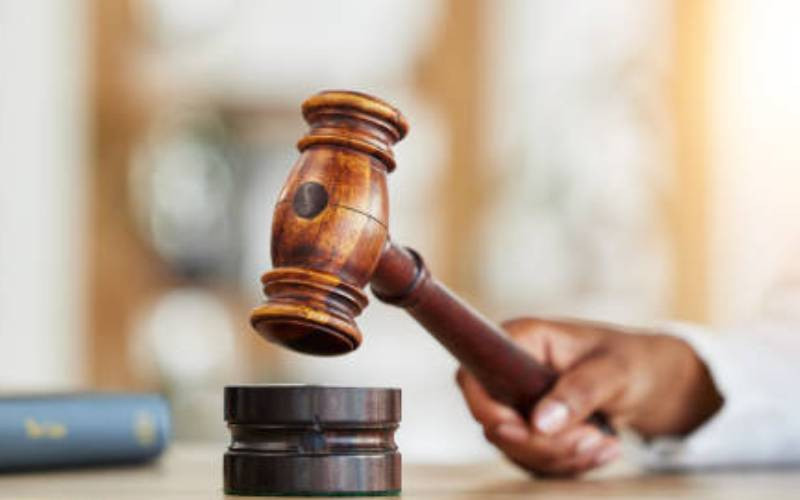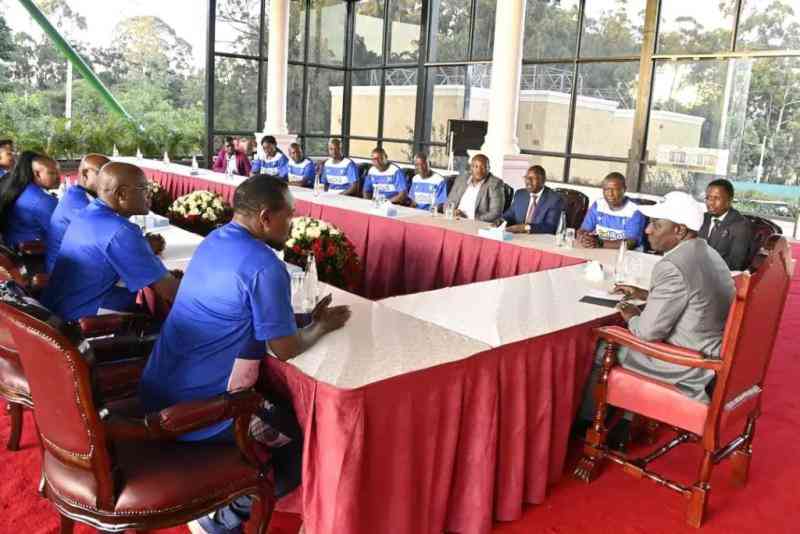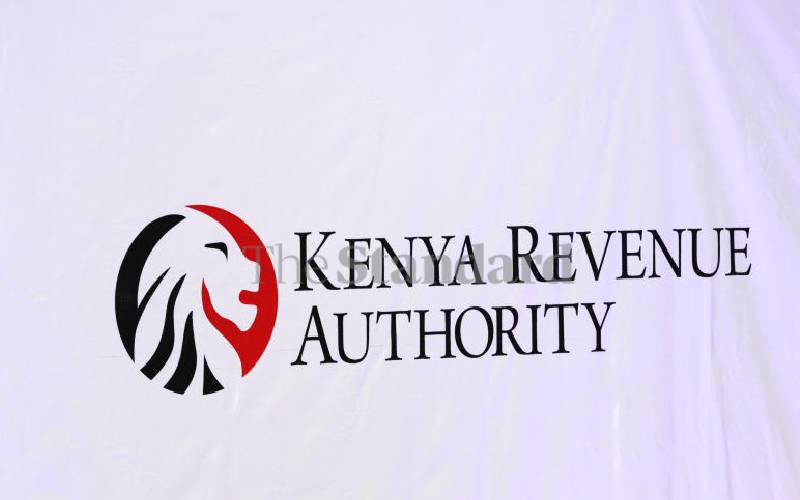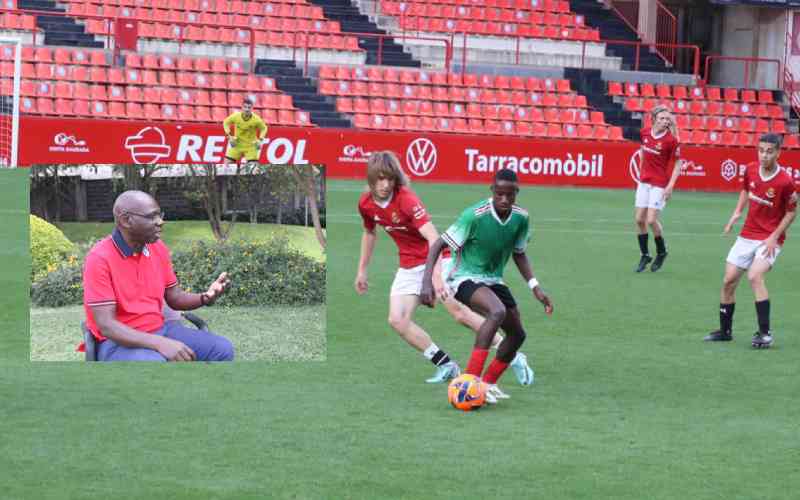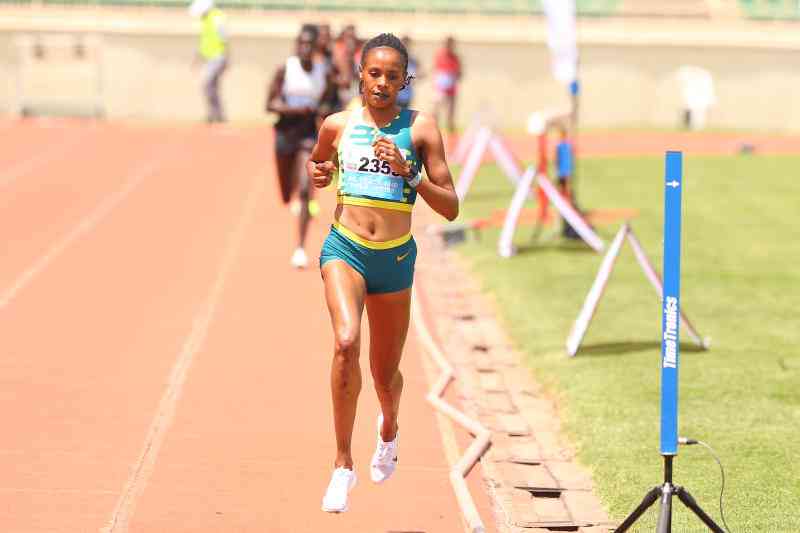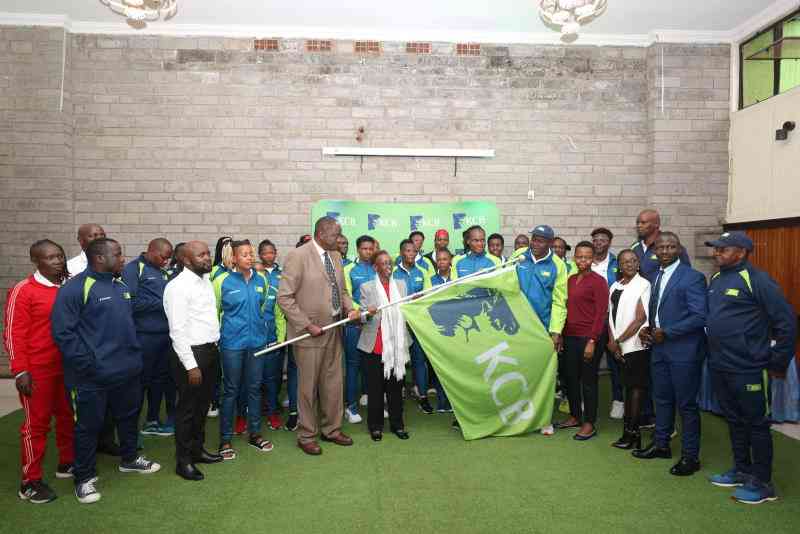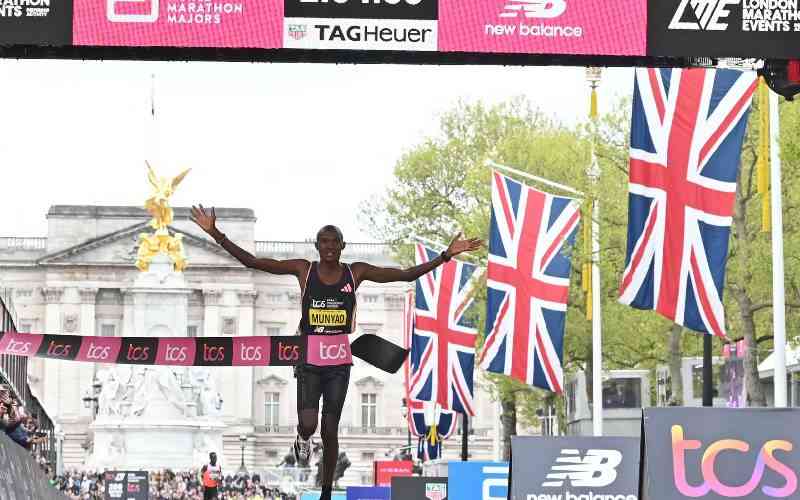 |
|
Mburu Njoba is now a precision engineer in England. (Photo:Courtesy) |
By Peter Njenga
Kenya: Most fans would have written off motorcycle racer Mburu Njoba after his near-fatal accident at the African championships in Lusaka, Zambia, left him in a coma for 12 days. Even his apprehensive family had feared for the worst as they sat by his hospital bedside on August 6, 2005.
Mercifully, the rider who had been racing on Kenya’s dusty motor tracks since the age of five is back on his feet and conquering new challenges. And after eight tumultuous years, the former Kenya motocross champion believes he has fully recovered from brain injuries sustained from a 30-foot plunge at 100 kilometres per hour and is now completely in charge of his destiny as an accomplished mechanical engineer in England.
Illusions
Mburu, 25, is under no illusions that he survived because of splendid work by a team of 12 doctors under neuro surgeons Prof Boffard and Dr Zorio at the Milpark Hospital in Johannesburg, South Africa, where he had been airlifted after the crash. Former Formula One racing champion Michael Schumacher has not been as lucky following brain injuries sustained from a skiing accident on December 28, last year and has been in a coma since.
Mburu was only an 18-year-old student at Taunton College in Somerset, England, when he was called up to the Kenya team for the Zambia race. Born in luxury and steered to physical and mental excellence by a no-nonsense father, Richard Njoba, a former Kenya rugby international, Mburu painfully pieces together events of August 6, 2005, a warm afternoon on a motor circuit in Lusaka. The rider had gone over the jump several times but during one of the jumps something went terribly wrong mid-air and sent hurtling at 100 kph 30 feet below.
Mburu has few recollections of the sequence of events after the accident and what he has been able to piece together after his crash helmet split has come as second hand information from other witnesses. As he was insured by Africa Air Rescue —AAR— a standby helicopter was called in and immigration requirements cleared in record time allowing for his airlift from Lusaka to Johannesburg. With his father Richard by his side, they landed at Milpark Hospital a few hours later where the doctors on standby immediately took charge.
Coma
The surgeons immediately induced a coma to avoid more pressure building in his skull then lowered his body temperature. As that was going on his father rang Mburu’s mother, Jane Njeri, his sister and grandmother who took the first flight they could get to South Africa. The situation was dire after the 10-hour operation and doctors had warned that there was a 50 per cent chance of survival.
On the twelfth day after the operation his father noticed some movement, Mburu recalls of the second hand information he had received.
“I’m told the first sign I gave to show I was regaining consciousness was that my one eyebrow moved. As there was always a family member by my bedside, dad was the one who noticed this and called mum and my sister Muthoni. Dad then said, “If you can hear us, move your eyebrow again’….which I did.”
“From there on it was one progressive milestone after another. On days that followed I was able to move my fingers, then toes, and so on . . . this went on for a week.”
Mburu could still not talk as he was on a life-support machine and had pipes sticking into his nose, mouth and throat. “Another pipe pierced my chest into my lungs. It was a long time before I could communicate verbally,” Mburu adds.
There was a sigh of relief from his family— including his grandmother Janet Mburu and Aunt Susan Kinyua. The family friends who had joined the Njobas in South Africa— Trudy and Phil Stegen, Michael Kok and Janet Kabeberi had become a permanent feature at the Thambo Mbeki Trauma Ward at Milpark Hospital.
Reception manager Dawlene Vanwyk also became part of the extended family.
“I came to know the doctors and really thank them,” says Mburu. Prof Boffard and Dr Zorio were in charge of trauma, while doctors Martin Sussman and Schleider were the cardiolothoracic experts.
Dr Hadjichrisofis did the bone grafting at Bedford Garden Hospital and on the third month when Mburu was ready to return home Dr Olunya of St Marks Hospital, Nairobi, took over.
During the recuperative period Mburu complained of pain in his right hand palm even though local diagnosis with x-ray and scans could not identify the problem.
In the meantime, the doctors’ instructions were clear. He was not allowed to do anything demanding to strain his brain . . . he was prohibited from returning to school for three months as his brain injuries had not fully recovered. “However, when I returned to SA for my mid-year review, the doctors were amazed at my recovery . . . . they had expected me to come back with some disability.
However, during this visit it was found that the fracture in his right hand palm was at the base of his thumb which doctors explained was due to the natural reaction of putting out one’s hand to break a fall.
Operations
“We were referred to the specialists in this field at Bedford Hospital, South Africa, and the operation that required bone grafting was carried out and a cast placed,” he adds.
When Mburu finally recovered, his father wrote the following letter to the medical team in South Africa.
“We want to thank you once again, and Dr Zorio and all staff at Milpark for all your care and attendance to our son Mburu Njoba. Since our last visit to Milpark when we called in at your office, I’m pleased to let you know that Mburu’s scaphoid healed very well and he has now convinced himself that indeed he is fully recovered by having taken the “last dose of medicine”, ie racing in the September 3 Kenya National Motocross championships at Jamhuri Park, Nairobi.”
Mburu describes his experience during this event . . . he surprised many spectators by finishing third in the first heat, then rallying after he had crashed to finish second in heat two.
After this minor crash, he re-mounted his motorcycle when the rider who was trailing the pack whizzed passed him. But Mburu managed to catch up with the pack ahead overtaking all the riders but the leader. Pundits agreed that this was one of his best races since he left the 80cc class in 1999.
His father’s letter aptly captured the drama of the young rider’s recovery.
“Now that he has proved to himself (of course, after many months of gym work and outdoor running that dropped 11kgs, and after only three straight weeks of riding practice after completing “one year off” on your orders) and to all of us that he is back to his old self, and he’s still got the riding skills, he resumed school in Taunton, Somerset, England, on 10th September and we hope he will be at peace with himself and give equal commitment to school work for his final ‘A’ level year.”
Continued Njoba: “You will be pleased to learn he went out for his first ride on his YZ 125 at the Jamhuri MotoX-track on Saturday, 12th August 2006, and enjoyed it so much that he returned to the track the following day, Sunday 13th and again on Tuesday, 15th August 2006. Other than a bit of cramping in his fingers, he says he feels like he hasn’t been off the bike for as long as the one year.”
Accident
After Mburu’s accident in Lusaka, many reports that followed advanced the theory of a defective helmet. However, his father does not think the helmet was defective.
“Many “opinions” have been expressed about the quality of the helmet that he had on at the time of the accident. The fact that it cracked was wrongly interpreted by some to imply that it was a “cheap” helmet. The reality is, if the helmet did not absorb the impact through a designed collapse pattern, something else would have had to give. The ground would not, which means the skull would have had to.
“The second fact is that x-rays and scans of Mburu’s skull that same evening did not have any hint of fracture. The helmet (very much like the front of a Mercedes is designed to crumble to absorb the force of a head-on collision to reduce the impact on the passengers inside the vehicle) did its job. It is designed to collapse progressively in defraying the force of impact. It gave itself up to save a life as you will learn from the attached report,” wrote Njoba.
Mburu’s was a well-deserved healing process because although he was able to walk after leaving hospital in South Africa, he had other pressing challenges.
After recovering from the accident, Mburu’s second challenge was to catch up with schoolwork. He had been out for a year so he did the impossible by taking two classes consecutively.
Recovery
“During my recovery, I was not allowed to go to school for three months, meaning that my contemporaries would have already started school on September 5 2005. So I chose to catch up once I was allowed to return to school on January 6, 2006 as opposed to sitting out the year and starting school with the lot of students who were a year behind me. This meant that I started school late into my second term, therefore, would not have covered enough ground to sit my exams.”
Mburu refused to repeat the class and, therefore, had to sit both his A-levels and A2-levels at the same time as opposed to sitting the As exams in one year and A2 exams the following year.
“It was very intense and meant I had to do back-to-back exams in my final year. When others were sitting six exams in final year I had to sit 13 exams and spend my examination period sleeping, eating and living in the school’s medical centre. I was not allowed to speak or meet any of my contemporaries as they would have already taken the exam papers and authorities had to ensure they did not share exam questions with me.”
With school over, Mburu’s other challenge was to live by example by encouraging other riders to accept his accident as a routine misfortune.
So his comeback race in a way saved a legion of riders who had decided to give up. There was a lot of fear among other riders in motocross after his crash in Zambia.
“I believe a few did not want or refused to race after that. After my full recovery, I got back to training in motocross. My return and good results instilled confidence in all the kids who witnessed my accident in Zambia.”
This was not Mburu’s first accident. Crashing is routine in this sport and prior to this accident, he suffered a concussion in France while attempting a triple jump . . . no one had ever attempted this jump in the 80cc category.
“It was very unfortunate as everything was right, but as I came up the jumps face, I went up a gear by mistake which killed my speed and resulted in me landing on the face of the last triple jump.”
He says racing has its risks like all other dangers in everyday life. There is greater risk involved in the sport, he admits, but you could just as well slip in the shower and injure yourself just as bad.
Dangerous
“All sports are dangerous, the only difference is the level of risk. A footballer can break a leg due to a slide tackle, and a rally driver can write off a car at a 160kph roll and walk away without a cut.”
It was Mburu’s choice to keep racing after his accident. His father Richard was brave to give his teenage son the liberty to decide if he wanted to keep racing.
Mburu at first refused to quit racing but later relented and promised his family that he would retire after one year of competition, says Njoba senior.
“After much thought and noting the hard work he had put in to fully recover, I recognised his argument that unless he proved to himself that he could do all that he used to do before the accident, full mental recovery would be difficult to attain,” says Richard.
“It was a mighty decision to let him get back on his bike, but on the morning one year of rest period expired, he woke me up and said it was time for bike practice. We as his parents had to keep our side of the deal, so he began by flat riding —no jumps—and following a schedule of ‘a little at a time’, he built up over weeks to his racing speed, tackling all jumps and turns, that we couldn’t deny him a race.
“We made a deal —it was more difficult for his mother than I to accept— that he will race up to the next AMU-2007, after which he would retire and concentrate on his A-levels,” says Njoba.
Mburu had parting shot to young riders after this race: Always ensure you take all the safety precautions before you get on a bike.
 The Standard Group Plc is a multi-media organization with investments in media
platforms spanning newspaper print operations, television, radio broadcasting,
digital and online services. The Standard Group is recognized as a leading
multi-media house in Kenya with a key influence in matters of national and
international interest.
The Standard Group Plc is a multi-media organization with investments in media
platforms spanning newspaper print operations, television, radio broadcasting,
digital and online services. The Standard Group is recognized as a leading
multi-media house in Kenya with a key influence in matters of national and
international interest.
 The Standard Group Plc is a multi-media organization with investments in media
platforms spanning newspaper print operations, television, radio broadcasting,
digital and online services. The Standard Group is recognized as a leading
multi-media house in Kenya with a key influence in matters of national and
international interest.
The Standard Group Plc is a multi-media organization with investments in media
platforms spanning newspaper print operations, television, radio broadcasting,
digital and online services. The Standard Group is recognized as a leading
multi-media house in Kenya with a key influence in matters of national and
international interest.



